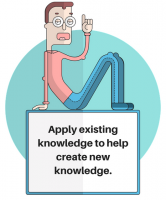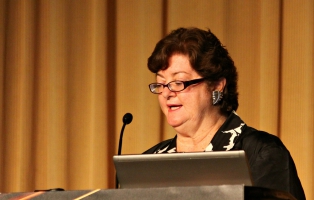In our recent interview with David Gurteen, a well-known name in the Knowledge Management industry, we spoke about a most discussed topic in Knowledge Cafes, and that was the topic of "Should you reward sharing knowledge in your organisation?". David argued that it does a lot more harm than good, and there is research to support that claim.
In 2005, a survey on Knowledge Sharing and reward was posted on the Gurteen Knowledge website, and the question asked was: “Do you think people should be rewarded for sharing their knowledge?”
Believe it or not, 43% of the voters agreed, and stated that they should be explicitly rewarded. 20% agreed, but noted that it...

Posted by TallyFox on 25 November 2016
Comment

Posted by TallyFox on 22 November 2016
Information environments have grown more complex and users expectations have increased. They are no longer happy with their enterprise search software offering results they haven't asked for and leaving out the ones that are relevant.
Search algorithms, regardless of how sophisticated and intelligent they are will never replace the need for a level of structured tagging, i.e. taxonomy.
Autotagging algorithms, if designed to operate without context, are very complex and often not available in many knowledge sharing solutions.
The best course of action is to simplify the taxonomy by organising it based on members’ expertise, using terms...

Posted by TallyFox on 21 November 2016
Behind a simple question "Why so many KM systems fail?" is an even simpler answer "Because they are not implemented to solve a business need".
There are many definitions of the term knowledge management, as it is a process that everyone executes differently.
What all definitions agree on is that knowledge management is a business process that defines the way organisations manage both documented and undocumented knowledge and the know-how their employees have about their services, products organisational systems and intellectual property.
Knowledge management consolidates the strategies and processes an organisation employs to pinpoint...

Posted by TallyFox on 21 November 2016
"Too many KM solutions focus on aggregation and summarization which only works for highly structured knowledge and information needs.", Dave Snowden said in his interview for our blog. Many of our readers agreed with him adding that it has already become a pattern. We believe that this pattern needs to be broken, as KM solutions need to be able to capture tacit knowledge and make it available.
Capturing tacit knowledge in a way that can be leveraged by the organisation is one of the largest challenges in KM processes, and it has been widely ignored in traditional knowledge management systems.
Let us take customer support industry as an example.
...

Posted by TallyFox on 05 November 2016
For people in the Knowledge Sharing industry, the name Jane Dysart is well known.
She is the principal of Dysart&Jones Associates and the program director for KMWorld, the most important event in our industry, gathering dozens of experts and hundreds of visitors each year, which we supported last year by becoming a platinum sponsor and presenting Tallium to the audience.
We opened our interview with a hot topic: the conference itself.
TallyFox: What's the goal of this year's topic: Hacking KM: people, processes and technology?
Jane Dysart: It's about trying to see KM in a different way. If you keep doing the same...





